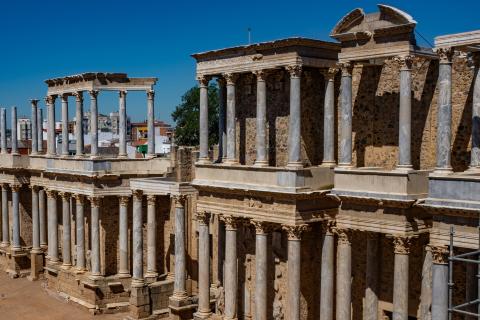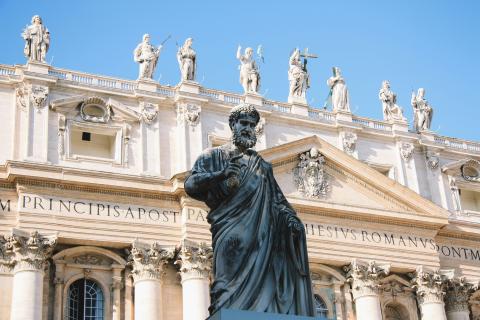
The word “fascist” gets thrown around a lot in political discourse, often as a vague smear. Those we don’t like are fascists precisely when they advocate for things we don’t like.
So what is fascism?
In the first part of the twentieth century, many people in the West came to recognize that the world was becoming a more complicated place. While governments had tended to be relatively “hands-off” in the past, people became increasingly convinced that the governments of the future would have to take a more active role in solving problems. (We would never expect private citizens to run a war, for instance, so why would we leave other problems of complex international policy and domestic ordering to private citizens?) From this outlook were born the twin brothers of communism and fascism.
Both communism (which often called itself socialism) and fascism arose as modern, post-Christian views of how human societies could be arranged. Their basic agreement was that the most fundamental human community – in other words, the place in which the human person would find meaning, identity, and guidance – was the state. More important than family, church, and local community, the state would provide for the ordering of human life and moral formation, and thus would require substantial power over and above those other communities. Any attempts by those communities to interfere in the project of the state would be seen as dangerous and subversive.
The difference between communism and fascism is not a difference between political left and political right. Instead, while communism viewed itself as an international movement based on economic class (hence slogans like “Workers of the World Unite!”), fascism viewed itself as a national movement, recognizing that people were more likely to commit to revolutions (non-violent and otherwise) with people who lived like them and near them. Benito Mussolini, longtime Prime Minister of Italy and founder of their Nationalist Fascist Party, was himself a student of communist revolutionary Vladimir Lenin, choosing fascism over communism due to this recognition.
In short, communism and fascism have long been similar ideologies fighting for the same turf rather than ideologies at opposite ends of the spectrum. While German Nazism lent “fascism” connotations of violent racialism and Spain’s Francisco Franco lent it connotations of dictatorship, these are not attributes of fascism on its own. This isn’t to rehabilitate fascism or any of these movements (fascism is obviously bad); instead, it’s an attempt at understanding what fascism really is.
So what can we take away from all this?
First, it helps us to see that “fascist” may not be a useful word in modern political discourse, as its chronic misuse has rendered it relatively meaningless. The tendency to label other political realities (such as racialism, socialism, liberalism, and conservatism) as fascist to turn them into smears is unhelpful. It would be an aid to clarity if things were called by their right names – and our political discourse is in desperate need of clarity.
Second, it helps us to see that communism and fascism aren’t the opposite extremes of the political spectrum, much less our only alternatives. The ancient alternative to these modern movements is the classical, Christian vision of the world. This vision holds up the family, church, and locality as the primary communities in which the human person will find meaning and guidance. This vision also declares that the ultimate horizon of human life is the transcendental and the spiritual: we are defined more by our eternal destinies than by the inevitably passing political movements and governments of our age.
What kind of thinker do you want to be? Perhaps better: What kind of thinker should you be? A Catholic author argues against the hyper-specialization many of us unwittingly pursue.
In a recent article, Bishop Barron argues that the “interpretive key” for understanding all of Vatican II is its document on divine revelation, Dei Verbum. One of its most important claims, he argues, is that Christianity is a revealed religion. (What does it mean to say that Christianity is a revealed religion?)
A town in England has forbidden making the sign of the cross, using holy water, or reciting Scripture in a “safe zone.”
In Virginia, state delegate Elizabeth Guzman has introduced a bill to prosecute parents who don’t affirm their child’s desire to identify as the opposite sex. When asked whether her bill is “criminalizing parents,” Guzman responded: “No, it’s not. It’s educating parents because the law tells you the do’s and don’ts.”
In the northeastern African country of Eritrea, problems are growing for Catholics as a bishop is arrested alongside two priests for reasons “currently unknown.”
To conclude: Should we stigmatize smartphone use?


